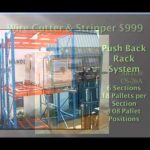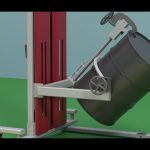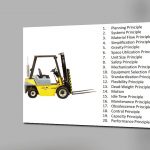Welcome to our YouTube video on Handling Machines. In this article, we will explore the various aspects of handling machines, including their uses, benefits, and important considerations. Whether you are a sales engineer looking for information on handling machines or simply interested in learning more about this technology, we have got you covered!
## Introduction to Handling Machines
Handling machines are an integral part of many industries, including manufacturing, packaging, and logistics. These machines are designed to automate the handling and movement of various types of products, materials, or objects. They can perform tasks such as lifting, transferring, rotating, and positioning items with precision and efficiency.
## The Importance of Handling Machines
Handling machines offer several advantages over manual handling processes. They not only reduce the need for manual labor but also increase productivity and improve safety in the workplace. By automating repetitive tasks, handling machines can free up human resources for more complex and value-added activities.
## Types of Handling Machines
There are different types of handling machines available in the market, each designed for specific applications and requirements. Some common types include:
1. Robotic Arms: These machines mimic the movement of a human arm and are often used for tasks that require a high level of dexterity and flexibility.
2. Conveyor Systems: Conveyor belts or roller conveyors are used to transport materials from one location to another. They are widely used in industries such as food processing, automotive, and warehousing.
3. Automated Guided Vehicles (AGVs): AGVs are autonomous vehicles that can move within a facility without the need for human intervention. They are commonly used in warehouses and distribution centers for material handling tasks.
4. Palletizers: Palletizers are used to stack and arrange products or materials on pallets for storage or transportation. They can handle different types of products, including boxes, bags, and containers.
## Benefits of Using Handling Machines
The use of handling machines offers several benefits to companies in various industries. Some of the key advantages include:
1. Increased Efficiency: Handling machines can perform repetitive tasks with greater speed and accuracy than humans, resulting in improved overall efficiency.
2. Cost Savings: By automating manual handling processes, companies can reduce labor costs and minimize the risk of injuries or accidents in the workplace.
3. Improved Safety: Handling machines eliminate the need for workers to perform physically demanding or hazardous tasks, reducing the risk of workplace injuries.
4. Enhanced Product Quality: With precise movements and consistent performance, handling machines can ensure that products are handled and packaged correctly, leading to improved product quality.
5. Scalability: Handling machines can be easily integrated into existing production lines or facilities, allowing for scalability and adaptability to changing production demands.
## Important Considerations for Handling Machines
When considering the implementation of handling machines in a production or logistics environment, there are several factors to take into account. These include:
1. Application-specific Requirements: Different industries and applications have unique handling requirements. It is essential to choose a handling machine that can meet the specific needs of your business.
2. Integration with Existing Systems: Handling machines should be compatible with existing production or logistics systems to ensure smooth operation and minimal disruption.
3. Maintenance and Support: Like any other machinery, handling machines require regular maintenance and technical support. Consider the availability of spare parts and after-sales services when selecting a handling machine.
4. Training and Skill Requirements: Depending on the complexity of the handling machine, operators may need specific training to operate and maintain the equipment effectively. Ensure that your workforce is adequately trained to operate the handling machine.
## Conclusion
Handling machines play a crucial role in automating material handling processes across various industries. They offer numerous benefits, including increased efficiency, cost savings, improved safety, and enhanced product quality. When selecting a handling machine, it is essential to consider application-specific requirements, integration with existing systems, maintenance and support, and training requirements.
Check the coil packing solution with a leading manufacturer for a professional solution. Just click here: [Insert URL of the manufacturer's website] Handling Machine
"Mastering the Art of Handling a Machine to Safely Grab a Little Boy"









